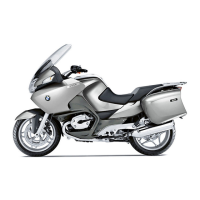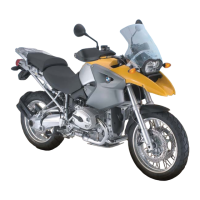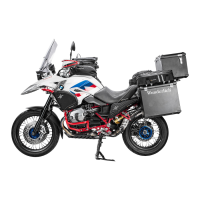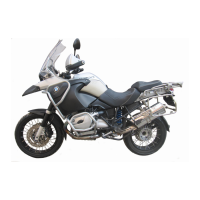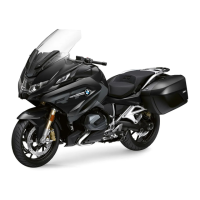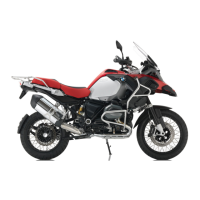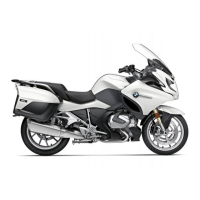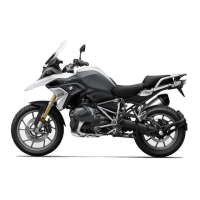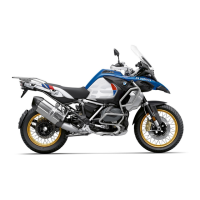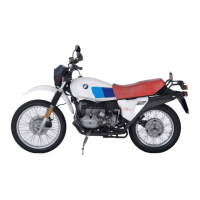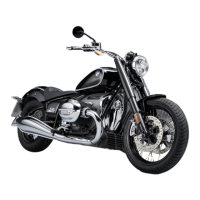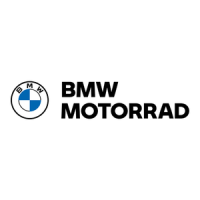
Do you have a question about the BMW Motorrad R 1200 RT 2013 and is the answer not in the manual?
| Displacement | 1170 cc |
|---|---|
| ABS | Standard |
| Fuel System | Electronic fuel injection |
| Tires Front | 120/70 ZR17 |
| Tires Rear | 180/55 ZR17 |
| Power | 110 hp (81 kW) at 7, 750 rpm |
| Torque | 120 Nm at 6, 000 rpm |
| Transmission | 6-speed |
| Seat Height | 820 mm |
| Fuel Capacity | 25 liters |
| Front Brakes | Dual disc, 320 mm |
| Rear Brakes | Single disc, 276 mm |
| Wheelbase | 1, 485 mm |
| Front Suspension | Telelever, 120 mm travel |
| Rear Suspension | Paralever |
Records for motorcycle model, VIN, color, and registration details.
Spaces for service contact and dealership stamp/information.
Provides an initial overview of the motorcycle and its manual.
Explains warning symbols and common abbreviations used in the manual.
Describes optional extras (OE) and accessories (OA) offered by BMW.
Details on dimensions, weights, and power ratings according to standards.
Notes on how motorcycle features may differ due to development and country variations.
Identifies components on the left side of the motorcycle with corresponding numbers.
Identifies components on the right side of the motorcycle with corresponding numbers.
Details components located underneath the motorcycle seat.
Explains the controls and functions of the left handlebar switchgear.
Explains the controls and functions of the right handlebar switchgear.
Identifies the gauges and displays on the motorcycle's instrument panel.
Details the various information shown on the central digital display.
Explains the meaning of different warning and telltale lights.
Specific information on the cruise control telltale light.
Explains how the service-due indicator functions and its display.
Information on how the vehicle's remaining range is calculated and displayed.
Details on the ambient temperature display and warnings for black ice.
Information regarding tyre pressure monitoring system (RDC).
General overview of warning lights and their meanings.
Explains how to operate the ignition switch and steering lock.
Information about the electronic immobiliser system and key handling.
Instructions on how to set the motorcycle's clock.
How to select and view various readings on the instrument display.
Operation of side lights and low-beam headlights.
Instructions for operating the left, right, and cancel functions of turn indicators.
How to activate and deactivate hazard warning flashers.
Description and operation of the emergency kill switch.
How to operate and adjust the heated grips.
Instructions for operating and adjusting the front and rear seat heating.
How to activate and deactivate the ASC system.
Operation of the cruise control system, including setting speed and deactivation.
How to open and close the motorcycle's storage compartments.
Instructions for adjusting the clutch lever and checking fluid level.
Adjusting the handbrake lever and checking brake function.
How to adjust the motorcycle's shift lever.
Instructions for adjusting the motorcycle's mirrors.
How to adjust the height of the windscreen.
Setting and adjusting the spring preload for the rear suspension.
Adjusting the damping characteristic for the rear wheel.
Explanation of the ESA system and how to adjust suspension settings.
How to check tyre pressures and recommended tyre sets.
Adjusting headlight beam for driving on different sides of the road.
Instructions for removing and installing the front and rear seats.
How to secure a helmet to the motorcycle using the helmet holder.
Essential safety advice for riders, including protective gear and riding posture.
Pre-ride checklist for important functions, settings, and wear limits.
Step-by-step guide for starting the motorcycle engine, including pre-ride checks.
Guidelines for the engine's running-in period, including speed limits and first inspection.
How to minimise stopping distance and handle wet/dirty brakes.
Instructions on using the side stand and centre stand for parking.
Information on recommended fuel grades, capacity, and safe refuelling practices.
Procedures for safely securing the motorcycle for transport.
Explanation of the integrated ABS system and its functionality.
How the ASC system works and its control over engine management.
Details on the tyre pressure monitoring system (RDC) and its function.
Explanation of the ESA II system for adjusting suspension settings.
Recommendations for using approved parts and accessories.
Notes on the use, automatic shutdown, and operating electrical accessories.
Instructions for opening, closing, removing, and installing the motorcycle cases.
Instructions for opening, closing, removing, and installing the topcase.
Overview of maintenance procedures and use of the toolkit.
Details of the standard and service toolkits provided with the motorcycle.
Procedures for checking brake function and front/rear brake pad thickness.
How to check the engine oil level and top it up.
Checking clutch function, fluid level, and related warnings.
Instructions for checking rims and tyre tread depth.
Tyre recommendations and the effect of wheel size on control systems.
Instructions for installing the front-wheel stand.
Replacing low-beam, high-beam, and parking light bulbs.
Removing and installing flashing turn indicators with fairing panels.
Procedures for safely jump-starting the motorcycle's engine.
Maintenance instructions for the battery, charging, and removal/installation.
Recommendations for using BMW cleaning and care products.
Guidelines for washing the motorcycle, including stain prevention and road salt removal.
Specific advice for cleaning plastic parts and other delicate components.
How to maintain paintwork, remove stains, and use recommended polishes.
Recommendations for applying car wax and when to reapply it.
Procedures for preparing the motorcycle for storage.
Steps for bringing the motorcycle back into use after storage.
A chart listing common engine starting issues and their rectifications.
Specifications for various threaded fasteners on the front and rear wheels.
Technical specifications for the motorcycle's engine design and performance.
Recommended fuel grades, usable capacity, and reserve fuel volume.
Details on engine oil capacity, recommended types, and topping up.
Technical specifications for the motorcycle's clutch type.
Gearbox type and detailed transmission ratios for each gear.
Specifications for the final drive type and rear suspension.
Technical details of the front and rear suspension systems.
Specifications for front and rear brakes, including pad material.
Recommended tyre sets and specifications for front and rear wheels.
Electrical rating of on-board sockets and fuse information.
Technical specifications for the motorcycle's battery type, voltage, and capacity.
Details on spark plug manufacturer, designation, and electrode gap.
Specifications for headlight, tail light, and indicator bulbs.
Information on the frame type and VIN location.
Key dimensions of the motorcycle, including seat height and leg arc.
Unladen weight, permissible gross weight, and maximum payload.
Top speed of the motorcycle.
Information on the global dealership network and authorized services.
Overview of roadside assistance and recovery services.
Details on pre-delivery checks and general maintenance procedures.
Explanation of the pre-delivery inspection performed by the dealer.
The running-in check procedure and its importance.
Information on scheduled annual servicing and service intervals.
Forms for recording pre-delivery and running-in check completion.
A table to record maintenance, repair, and special campaign work details.
Certification details for the Tire Pressure Control (TPC) system.
